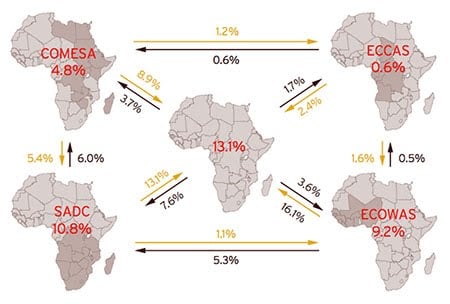The concept of African unity has been a long-held aspiration, tracing its roots back to the pan-Africanist movement of the early 20th century. In 2001, this dream took a tangible form with the establishment of the African Union (AU). The AU serves as a continental platform for collaboration, fostering cooperation among African nations in various areas, including economic development, peace and security, and human rights.

Image: foreignpolicyblogs.com
Among its endeavors, the promotion of intra-African trade stands as a cornerstone of the AU’s mission. Intra-regional commerce forms the lifeblood of any vibrant economic bloc, stimulating growth, reducing poverty, and enhancing resilience to external shocks. Recognizing this, the AU has implemented several initiatives to facilitate and enhance trade between its member states.
Breaking Down Barriers: The African Continental Free Trade Area
At the heart of the AU’s trade strategy is the African Continental Free Trade Area (AfCFTA). Launched in 2018, the AfCFTA aims to create a single, continental market, eliminating tariffs and other barriers to trade. The goal is to foster seamless movement of goods and services across borders, allowing African businesses to compete on a more level playing field.
The establishment of the AfCFTA marks a watershed moment in African history. It represents a collective commitment to economic integration and prosperity. By reducing trade barriers, the AfCFTA is expected to boost intra-African trade by more than 50%, opening up new markets for businesses and creating opportunities for entrepreneurs.
Powering Growth: Economic Benefits of Intra-African Trade
The economic benefits of intra-African trade are far-reaching. Increased trade stimulates economic growth, creates jobs, and reduces poverty. When countries trade with each other, they benefit from specialization and economies of scale. African nations can harness their collective strengths to produce goods and services that are competitive in both regional and global markets.
Furthermore, intra-African trade promotes diversification, reducing reliance on a narrow range of export commodities. This diversification enhances economic resilience, making African economies less vulnerable to external shocks, such as fluctuations in global prices for raw materials.
More Than Commerce: Social and Political Implications
The benefits of the AfCFTA extend beyond the economic realm. By fostering closer economic ties, the AU aims to strengthen political cooperation and regional integration. Increased trade can facilitate cultural exchange, breaking down barriers between African nations and promoting a sense of shared identity.
Moreover, intra-African trade can contribute to peace and security. Economic prosperity and interdependence create incentives for countries to resolve conflicts peacefully and work together for mutual benefit. By creating a shared economic space, the AfCFTA lays the foundation for a more stable and prosperous African continent.

Image: peoplesdispatch.org
Challenges and the Road Ahead
While the AfCFTA holds immense promise, it faces challenges that must be addressed to fully realize its potential. Infrastructure deficiencies, such as inadequate transportation networks and unreliable energy supply, can hinder the movement of goods and services. Additionally, differences in regulations and standards, as well as non-tariff barriers, continue to impede cross-border commerce.
To overcome these challenges, the AU and its member states must work together to strengthen infrastructure, harmonize regulations, and address non-tariff barriers. Capacity building is also essential, ensuring that businesses, especially small and medium enterprises, have the tools and expertise to navigate the complexities of cross-border trade.
Africa Union Trade
Embracing the Future: Africa’s Economic Transformation
The Africa Union’s commitment to intra-African trade represents a bold step toward the continent’s economic transformation. By breaking down barriers, fostering economic growth, and promoting regional integration, the AU is creating a more prosperous and united Africa. The AfCFTA holds the promise of transforming Africa’s economic landscape, unlocking its vast potential and empowering its people to build a brighter future.
As Africa strides towards this future, it is essential to remember that trade is not merely an end in itself. It is a means to achieve the broader goals of poverty reduction, sustainable development, and peace. By harnessing the power of intra-African trade, the African Union is not only unlocking economic growth but also fostering a more just and equitable society for all Africans.






